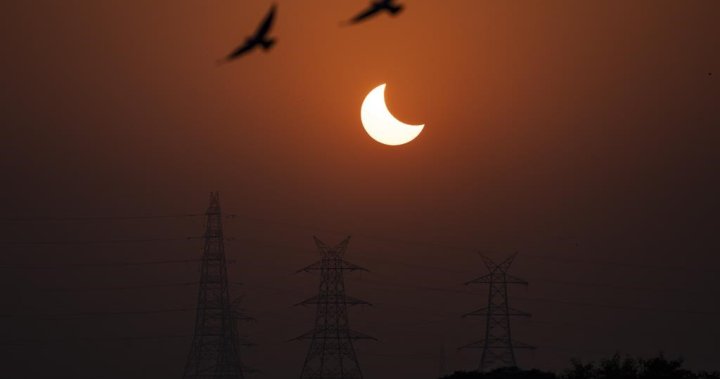When millions tilt their heads to the sky to watch the solar eclipse Monday, Chelsea Paquette will instead be watching a pair of Asian Himalayan Black Bears.
Paquette is a conservation co-ordinator at the Granby Zoo outside Montreal and is participating in a study on how animals react to an eclipse.
She’s not expecting much from the bears.
“They’re slower-moving animals, that’s for sure,” Paquette says. “They’re also nocturnal, so we do expect them to spend a lot of time sleeping.”
The zoo has selected 12 species as part of the study. In total, there are 50 animals. Among them are Red Pandas, snow leopards, zebras and ostriches.
The study was pitched by a local astronomer, Pierre Chastenay. He’ll be watching the zoo’s community of 13 Japanese Macaque monkeys.
“They’re very social animals,” Chastenay says.
“So it will be interesting to look at their social interaction during the eclipse.”
This will be Chastenay’s fourth eclipse. He’s travelled as far away as Australia to take in the rare celestial phenomenon. But the path of totality of Monday’s eclipse runs right over Chastenay’s home, and the nearby zoo.
He says he tried to research animal behaviour during an eclipse but found very little, so he proposed the zoo conduct its own study.
“It will get very dark, like 30 to 45 minutes after sunset,” he says. “Temperatures will drop. The wind will pick up. So all these phenomenon will influence the behaviour of the animals.”

The teams have already been studying the animals. They’ve spent three hours on two days watching their normal behaviour. They’ll also do the same two days after the eclipse. That will give them a baseline to determine if the reaction during the eclipse is different from how they would usually act.
Over the hours they’re watching, the researchers enter each animal’s actions into an app every minute.
Breaking news from Canada and around the world
sent to your email, as it happens.
Paquette’s bears haven’t been busy.
“I’ve definitely entered the behaviour ‘chilling’ and ‘sleeping’ a lot,” she says.

The Granby Zoo is working in collaboration with the Fort Worth Zoo in Texas.
Dr. Adam Hartstone-Rose is a professor of biological sciences at North Caroline State University in Raleigh. He’s working with graduate students to observe animals in Fort Worth.
Hartstone-Rose ran a similar study during the eclipse in 2017.
In that study, his team watched 17 animals and found about three-quarters seemed to have a notable reaction.
He says most animals showed signs of a circadian response. The darkness appeared to make them act as if was nighttime. Some went to their nighttime enclosures or to their feeding areas. Several animals also appeared to show signs of anxiety.
“The only time I’ve seen a giraffe running is when they’re startled by a predator or vehicle or something like that,” Hartstone-Rose says.
“And yet, in 2017, we saw the giraffe at the zoo start galloping. I mean, it was amazing.”
Another animal that reacted strongly was the zoo’s Komodo Dragon, the world’s largest lizard. It hadn’t moved in the two days prior, but when the eclipse started, it ran around and climbed the walls of its enclosure.
Prior to that, Hartstone-Rose says he had thought it might have been dead, and didn’t expect it to move.
“I mean, it literally could have been a taxidermy mount. I wasn’t 100 per cent convinced it was still alive until the totality.”

The rarity of an eclipse makes everything about it hard to study.
Hartstone-Rose says there are more scientific studies about Sasquatch than there are about animal behaviour during an eclipse. He hopes to at least tighten the gap with the results of this project.
And if he’s busy while millions of other people are gazing at the sky, he won’t complain.
“I find the animal behaviour even more interesting than what’s happening with the sun,” he says.
© 2024 Global News, a division of Corus Entertainment Inc.








